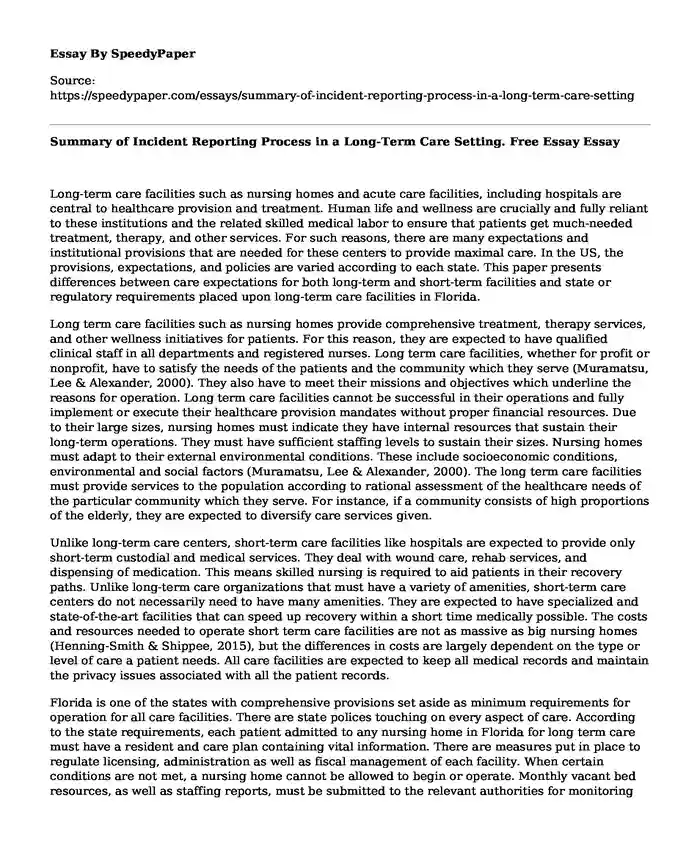
| Type of paper: | Essay |
| Categories: | Healthcare Nursing care Human services |
| Pages: | 3 |
| Wordcount: | 706 words |
Long-term care facilities such as nursing homes and acute care facilities, including hospitals are central to healthcare provision and treatment. Human life and wellness are crucially and fully reliant to these institutions and the related skilled medical labor to ensure that patients get much-needed treatment, therapy, and other services. For such reasons, there are many expectations and institutional provisions that are needed for these centers to provide maximal care. In the US, the provisions, expectations, and policies are varied according to each state. This paper presents differences between care expectations for both long-term and short-term facilities and state or regulatory requirements placed upon long-term care facilities in Florida.
Long term care facilities such as nursing homes provide comprehensive treatment, therapy services, and other wellness initiatives for patients. For this reason, they are expected to have qualified clinical staff in all departments and registered nurses. Long term care facilities, whether for profit or nonprofit, have to satisfy the needs of the patients and the community which they serve (Muramatsu, Lee & Alexander, 2000). They also have to meet their missions and objectives which underline the reasons for operation. Long term care facilities cannot be successful in their operations and fully implement or execute their healthcare provision mandates without proper financial resources. Due to their large sizes, nursing homes must indicate they have internal resources that sustain their long-term operations. They must have sufficient staffing levels to sustain their sizes. Nursing homes must adapt to their external environmental conditions. These include socioeconomic conditions, environmental and social factors (Muramatsu, Lee & Alexander, 2000). The long term care facilities must provide services to the population according to rational assessment of the healthcare needs of the particular community which they serve. For instance, if a community consists of high proportions of the elderly, they are expected to diversify care services given.
Unlike long-term care centers, short-term care facilities like hospitals are expected to provide only short-term custodial and medical services. They deal with wound care, rehab services, and dispensing of medication. This means skilled nursing is required to aid patients in their recovery paths. Unlike long-term care organizations that must have a variety of amenities, short-term care centers do not necessarily need to have many amenities. They are expected to have specialized and state-of-the-art facilities that can speed up recovery within a short time medically possible. The costs and resources needed to operate short term care facilities are not as massive as big nursing homes (Henning-Smith & Shippee, 2015), but the differences in costs are largely dependent on the type or level of care a patient needs. All care facilities are expected to keep all medical records and maintain the privacy issues associated with all the patient records.
Florida is one of the states with comprehensive provisions set aside as minimum requirements for operation for all care facilities. There are state polices touching on every aspect of care. According to the state requirements, each patient admitted to any nursing home in Florida for long term care must have a resident and care plan containing vital information. There are measures put in place to regulate licensing, administration as well as fiscal management of each facility. When certain conditions are not met, a nursing home cannot be allowed to begin or operate. Monthly vacant bed resources, as well as staffing reports, must be submitted to the relevant authorities for monitoring (Polivka, 2018). Electronic capturing of data and any other patient information is also mandatory by any facility within Florida State.
In conclusion, long and short-term care facilities must be well managed and regulated by the relevant state authorities because they are crucial centers of recovery, treatment, therapies, and other wellness programs. The expectations for nursing homes and outpatient centers are slightly different, but each requirement is important and must be observed by each type of facility.
References
Henning-Smith, C., & Shippee, T. (2015). Expectations About Future Use Of Long-Term Services And Supports Vary By Current Living Arrangement. Health Affairs, 34(1), 39-47. doi: 10.1377/hlthaff.2014.0556
Muramatsu, N., Lee, S., & Alexander, J. (2000). Hospital Provision of Institutional Long-Term Care. The Gerontologist, 40(5), 557-567. doi: 10.1093/geront/40.5.557
Polivka, L. (2018). Corporate Long-Term Care In Florida And Its Implications For The Future Of Long-Term Care In The U.S. Innovation In Aging, 2(suppl_1), 225-225. doi: 10.1093/geroni/igy023.831
Cite this page
Summary of Incident Reporting Process in a Long-Term Care Setting. Free Essay. (2023, Feb 23). Retrieved from https://speedypaper.com/essays/summary-of-incident-reporting-process-in-a-long-term-care-setting
Request Removal
If you are the original author of this essay and no longer wish to have it published on the SpeedyPaper website, please click below to request its removal:
- Essay Example on Bootstrap Funding
- Business start up
- Essay Example: Social and Economic Justice in Missouri
- Organizations' Shared Vision, Leadership Essay Example
- Free Essay about Agile Techniques in Tricentis Company
- Free Essay Example - Priority Setting
- Free Essay. Expanded Program on Immunization in Pakistan
Popular categories




